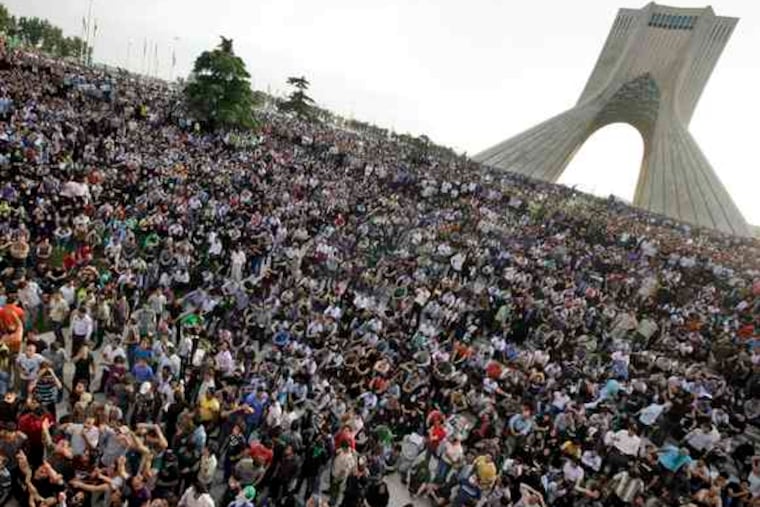Back Channels: U.S. must declare support
Obama should stand forcefully with Iran's protesters, despite the risk.

This could be a time of lamentations and despair for conservatives. They are out of power. Much derided in the punditry. Largely ignored on policy.
Or it could be a moment of opportunity, says Robert P. George, Princeton professor and founder of the new American Principles Project.
"This is a time of reflection for the conservative movement," George said in a recent interview. "And this is a good time to repair to first principles."
Principles such as respect for the equal dignity of all human beings. Limited government. National security. Democracy. Private property. The rule of law and market system of exchange.
George, a former member of President George W. Bush's Council on Bioethics, wants to use those timeless ideals to address the day's problems. Among them, abortion, embryo destruction, and the sexualization of children; national sovereignty in an age of internationalism; security and antiterrorism policies; and democracy promotion.
Not a light load. And one difficult to promote when it means challenging a president popular with Americans and lionized by much of the media. Newsweek magazine editor Evan Thomas recently dubbed Barack Obama a "sort of god."
How does one challenge a "sort of" deity? With the truth as you see it, George says.
"Truth has power," he says. "If you're going to deal with a problem, the first thing is to trust the truth and speak it out loud."
George points to the protests in Iran over the election that allegedly gave President Mahmoud Ahmadinejad a landslide win over challenger Mir Hossein Mousavi.
As of Wednesday morning, George was concerned that the president wasn't doing enough to support the protesters and had limited his remarks to the election results.
"We have every reason to think this is much deeper than one stolen election," George said. "It's the oppression of people, of women, of religious minorities and Muslims themselves who want to claim the freedom that is rightfully theirs against a tyranny that has held power for many decades."
If Americans believe in the central truths of their founding documents - i.e., that not just Americans, but all, are created equal - then those truths, George says, apply "to Iranians, and Saudis, and the Chinese, and the people of North Korea."
"Our principles tell us to be concerned about liberty and safety and the rights of people abroad," George said. "We cannot be the world's policeman, I understand that. And there are issues of prudence that limit what we can do. . . .
"But we should signal to the Iranians that we are on their side, and help in any way we can."
Speaking out forcefully and truthfully might offend Iran's ruling clerics and its incumbent president, but that is a risk worth taking.
George recalls how Ronald Reagan's use of the term evil empire to describe the Soviet Union was derided by critics as "belligerent and unnecessarily provocative." For political prisoners, though, it was a ray of hope.
"One day, my Soviet jailers gave me the privilege of reading the latest copy of Pravda," writes former Soviet dissident Natan Sharansky in his book The Case for Democracy. "Splashed across the front page was a condemnation of President Reagan for having the temerity to call the Soviet Union an 'evil empire.' Tapping on walls and talking through toilets, word of Reagan's 'provocation' quickly spread through the prison. The dissidents were ecstatic. Finally, the leader of the free world had spoken the truth - a truth that burned inside the heart of each and every one of us."
George says, "There is some Sharansky in an Iranian prison right now. There are lots of Sharanskys on the streets of Tehran waiting to hear an American leader speak the truth and . . . initiate the chain of events that will result in the overthrow of tyranny and establish an honorable, legitimate democratic republic."
Obama's caution may indicate that he, too, believes the blunt talk of a Reagan is provocative and risky.
"He thinks you talk people like Ahmadinejad into behaving better," George says. "But the history of tyrants, whether talking about Mao or Hitler or Pol Pot or Ho Chi Minh or Stalin, shows us that tyrants are not talked into treating people with respect and honoring their liberties and human rights.
"It takes a firmer policy, and that doesn't always mean using the military. But it needs to be firm, and at base, it means a willingness to speak the truth out loud. Otherwise, you're not making operative the power of the principles on which our nation is based."
Stand up for principles. Speak aloud the truth that will burn inside the heart of each and every one of us. Good advice for despairing conservatives, or a president.